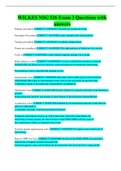WILKES NSG 526 Exam 3 Questions with
answers
Primary prevention CORRECT ANSWERS Actually preventing the thing
Secondary Prevention CORRECT ANSWERS early identification and treatment
Tertiary prevention CORRECT ANSWERS Avoiding complications
Norms are considered CORRECT ANSWERS The right patterns of behavior for a society
Crisis is CORRECT ANSWERS a time limited response lasting 4 to 6 weeks
What initiates a crisis CORRECT ANSWERS A crisis is initiated by internal or external demands that are perceived as a threat to a persons physical or emotional functioning. Precipitating event is stressful and unusual or rare.
maturational crisis CORRECT ANSWERS Describes unfavorable person-environmental relationships that relate to maturational events such as leaving home for the first time, completing school or accepting the responsibility of adulthood.
Situational Crisis CORRECT ANSWERS Occurs whenever a specific stressful event threatens a person's
biopsychosocial integrity and results in some degree of psychological disequilibrium
Aventitious Cirsis CORRECT ANSWERS Initiated by an unexpected unusual events that can affect an individual or
a multitude of people. National and natural disasters .
During an adventitious crisis (e.g., flood, hurricane, forest fire) that affects the
well-being of many people, the interventions of the PMH-APRN will be a part of
the community's efforts to respond to the event.
Goal for people experiencing crisis CORRECT ANSWERS To return to pre-crisis level of functioning.
Role of APRN in Crisis CORRECT ANSWERS he role of the PMH-APRN is to provide a framework of support systems that guide the
client through the crisis and facilitate the development and use of positive coping skills. Assess risk of homicide/suicide/self-injury
Assess coping skills
Assess perception of problem and support mechanisms
Assess biologic items - sleep, eating, hygiene, etc
Assess psychological - emotions and coping
Asses social - individual, family, community. Social support
Disaster CORRECT ANSWERS A disaster is a sudden ecological or man-made phenomenon that is of sufficient
magnitude to require external help to address the psychosocial needs as well as
the physical needs of the victims
MCI triage category: Expectant CORRECT ANSWERS Injuries are extensive and chances of survival are unlikely
even with definitive care. Separate and provide comfort
Unresponsive patients with penetrating head wounds, high
spinal cord injuries, wounds involving multiple anatomical sites
and organs, 2nd/3rd degree burns in excess of 60% of body surface area, seizures or vomiting within 24hr after radiation
exposure, profound shock with multiple injuries, agonal
respirations; no pulse, no BP, pupils fixed and dilated
MCI Category: Immediate CORRECT ANSWERS Injuries are life-threatening but survivable with minimal
intervention. Individuals in this group can progress rapidly to expectant
if treatment is delayed.
Sucking chest wound, airway obstruction secondary to
mechanical cause, shock, hemothorax, tension pneumothorax,
asphyxia, unstable chest and abdominal wounds, incomplete
amputations, open fractures of long bones, and 2nd/3rd degree
burns of 15%-40% total body surface area MCI Category: Delayed CORRECT ANSWERS Injuries are significant and require medical care
but can wait
hours without threat to life or limb. Individuals in this group receive
treatment only after immediate casualties are treated.
Stable abdominal wounds without evidence of significant
hemorrhage; soft tissue injuries; maxillofacial wounds without
airway compromise; vascular injuries with adequate collateral
circulation; genitourinary tract disruption; fractures requiring
open reduction, débridement, and external fixation; most eye
and CNS injuries
MCI Category: Minimal CORRECT ANSWERS Injuries are minor and treatment can be delayed
hours to days.
Individuals in this group should be moved away from the main triage
area.
o
Upper extremity fractures, minor burns, sprains, small
lacerations without significant bleeding, behavioral disorders or
psychological disturbances
Psychological Assessment CORRECT ANSWERS Assess the victim for behaviors that indicate a
depressed state, presence of confusion, uncontrolled weeping or screaming,
disorientation, or aggressive behavior. Ideally, the PMH-APRN should assess the
coping strategies the victim uses to normally manage stressful situations.
ABC's of Psychological First Aid CORRECT ANSWERS The
ABCs of psychological first aid
include focusing on A (arousal), B
(behavior), and C (cognition). When arousal is present, the intervention
goal is to decrease excitement by providing safety, comfort, and
consolation. When abnormal or irrational behavior is present, survivors
should be assisted to function more effectively in the disaster and when
cognitive disorientation occurs, reality testing and clear information
should be provided.
After initital assessment the PMH- APRN should CORRECT ANSWERS support the
development of resilience, coping, and recovery while providing
technical assistance, training, and consultation




